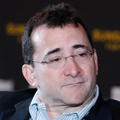Drew Westen speaking during the “It’s All in the Story” panel. Photo by Chad Hurst.
Eric Hynes
In addition to the 181 of films being presented at this year’s Festival, there’s also an ambitious slate of panels, populated by an eclectic mix of artists, film industry professionals and an array of leading edge thinkers, politicians and academics. What they all have in common is a shared interest and investment in how film impacts and intersects with the culture at large.
To that end, we’re conducting a series of conversations with some of the more notable participants whose expertise lies in disciplines that on the surface might seem to have little to do with the filmmaking process. But after digging a little deeper, it becomes clear how their work has informed the art and craft of narrative and documentary storytelling and how film continues to inform and shape their research and ideas.
Drew Westen is a professor of psychology at Emory University and the author of the game-changing book, The Political Brain, which tracks the previously overlooked role that emotions play in the development of a political self and a political society. The key to effective political discourse, according to Westen, lies in understanding how the brain functions, and making connections between the theoretical (policies) and the emotional (how they make us feel).
For the past decade Westen has shifted emphasis—without shedding his Renaissance man multitasking—from personal consultation and academic research to serving as a highly sought-after political advisor, predominately for the Democratic Party.
In a widely read New York Times Op-Ed column published last August, Westen criticized President Obama for failing to shape his policies into a coherent and effective narrative, the very thing that propelled him to the Presidency in the first place. In anticipation of his participation in “It’s All in the Story,” a panel that includes novelist Margaret Atwood and Senator Barbara Boxer, we talked to Dr. Westen about the importance of effective storytelling for both politicians and filmmakers.
Your work actually seems applicable to any storytelling form. How would you apply your work to the realm of film?
It is, and I’ll tell you how in a slightly circuitous way. I’ve spent much of my career listening to the stories that ordinary people tell about their lives—either as a psychotherapist or as a researcher, distilling their personalities in ways that they might not be able to articulate themselves. I’m interested in hearing how they understand themselves, their emotions, the blunting of emotions, and then turning the answers into numbers to measure a personality.
In a funny way, my work in politics is the converse of that. I’m still listening to the stories that candidates and parties tell, but going further than that to make inferences about why it does or doesn’t resonate with the average person. First and foremost what I learned, which the American Right understood, is that you can’t convince anyone by representing facts and figures. You have to offer a coherent narrative that evokes the values that you want them to feel. That evokes gut level emotions. Which applies to making films, too.
Karl rove understood what you could do with a good story. Whereas the Democrats thought the goal was to convince people, like in a college debate. So I started to analyze speeches, ads and communication the same way that I had analyzed patients and research subjects, to understand what they were evoking, what they meant, what was their structure. In the telling of a story you can learn how people feel about themselves, what triggers feeling, etc.
So how would we construct a narrative to get people to give a damn about climate change? What’s the imagery? what’s the structure? How do you get people to listen to you? What’s the broader narrative? What do we stand for in general? What’s story you can tell people that moves them? These are the same things that a good filmmaker does by getting you to go along for a ride with them.
My work in politics has always been about language not film; but there isn’t a message I’ve written in the last 5 years that couldn’t readily be turned into an ad with images and music. Because that’s how I think. The connections between language and the circuits in the brain that control emotions are a good couple of steps removed from each other, whereas what gives us a visceral reaction is our sensory perception. If your words can’t evoke taste or sound, they won’t move people.
Your Op-Ed on Obama was pretty damning. It sounds like he could use your help in shaping a national narrative.
I started out very enthusiastic about Obama. He could do what no other Democrat other than Clinton could do, which was to tell a story. He could make people feel what he seemed to feel. But over the last three years, I’ve gotten increasingly frustrated by his unwillingness or inability to do what he’s capable of doing.
There’s an absence of a narrative that people could hang their hats on. He’s just hammering people over the heads instead of asking why the economy hasn’t come back, and why it crashed. Why have people lost their homes? Parents don’t have an answer for their children. Even putting it this way, I’m telling the story in a different way.
What’s your process for determining what stories to tell?
What I ended up doing was to present a group of voters with very brief narratives that could be expanded into a speech or contracted into a single sentence. What’s the story on taxes that a progressive could tell, that people will want to hear? Eight or nine different versions that basically tell the same meta story, with the same moral intuition at the end. This isn’t right and needs to be changed, or it’s good and needs to be pursued. Then it’s about determining which ones reach them, and how.
Working with focus groups sounds something like test screenings for films, trying stories on for size, in a sense. How do you make the most of these groups without dulling the edges or watering a story down from too much input?
In my work, I put together multiple ways to tell a story, a luxury you don’t have as a filmmaker. You can have different cuts, but when it’s grafs of text or versions of an ad, you’ve got more room to play with. What would happen if I overtly raised this theme of prejudice in this message about Medicaid? Or immigration? What happens if I do it too early or late, or before or after something?
When you’ve got the latitude and 1000 people at your disposal, you can measure it. You can see when hundreds of people are dialing up or down. Other times you have to have a clinical sensibility, the sensibility of a director, producer, narrator or actors, knowing when to override what you’re hearing or seeing in these tests. Much like you’d override what you hear in a focus group.
People will almost always dial down on something that is “negative,” and the question is always then whether to remove things. I’ll look at it and I might, but I may not because I can see that they dialed down so strongly that it affected them. Their conscious and unconscious reactions are so different. They may say it’s negative and they don’t like it, but in fact there are ways that you can measure people’s unconscious reactions to ads.
I’m surprised that this hasn’t been used yet by Hollywood in the making of trailers. I’ll see one and think, “How could someone have approved that? Is that your best advertisement?” Either the subtlest aspects are hard to get across in 60 seconds, or the people putting these together are not the same people who made the movie.
They’re generally not the same people. It’s probably best that filmmakers don’t have to worry about that end of it. But there could definitely be more creativity—and honesty—in the selling of films.
Marketing people now have just one hammer. There’s a real distinction between what filmmakers understand and what marketing people are good at. It should be about associations, triggers. Your trigger is unconscious, and always visceral. People who do marketing research often misunderstand that people can’t always say what their responses are.
They certainly can’t tell you what caused their responses. From spending time in focus groups you realize that people will tell you conscious answers for unconscious questions. They start making things up. What was it about that movie that moved you? They can sometimes tell you with accuracy, but often things are either consciously or unconsciously designed to make you feel something, whether it’s the image, the movement or the tone.
A gifted director is going to be doing that unconsciously, and the average person couldn’t tell you what it was. We ask people in focus groups to be great directors. But they’re not. And they make things up.
What kinds of film stories affect our brain the most? And what makes us start to get off the train, as it were, to start feeling manipulated rather than moved?
When it’s fiction, most people want to be moved. With a romance or action thriller, you actually want it to do things to you. Make you laugh, cry, feel for the characters. Otherwise you feel like you’ve been to a crappy movie. For documentaries, there’s a limit to that.
People often come in expecting a particular point of view, but what you don’t want is a bland retelling of a non-story that doesn’t move you, that doesn’t set out protagonists and antagonists, that doesn’t have an ethical battle or stakes. You want to have your emotions touched by a doc.
Something like Inside Job strikes me as a great example of something that hits that level of making you outraged and surprised, but you don’t really feel like you’re being manipulated. You’re being walked through a history that you didn’t previously understand.
What’s an example of a well-told story that’s positively affected change, in your view?
The only issue in politics where the country is moving into the 21st century rather than back to the 18th is gay rights. And I think the biggest factor has been the portrayals of homosexuals in movies and television. Bringing gay people into everyone’s living room, identifying with rather than laughing at them. It’s an opportunity for social change, and also for manipulation. If you’re James Dobson, you’d say this has been a terrible thing. If you’re someone like me, you think it’s wonderful.




